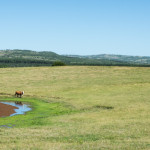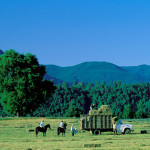Tag: South America

Seeds of Hope: IRI in Uruguay
This story was written by David Craig and originally appeared in the Spring 2015 issue of Columbia Magazine. Photography and additional reporting by Francesco Fiondella. As climate change creates agricultural instability around the world, Columbia scientists are testing a seasonal forecasting system in Uruguay to give farmers a fighting chance. Daniel Lalinde doesn’t need a […]
Climate, Landowner Residency, and Land Cover Predict Local Scale Fire Activity in the Western Amazon
Author(s):
A Climate Generator for Agricultural Planning in Southeastern America
Author(s):
Land Cover Change Interacts With Drought Severity to Change Fire Regimes in Western Amazonia
Author(s):

IRI’s First International Office
On August 14, the International Research Institute for Climate and Society signed an agreement with Uruguay’s Instituto Nacional de Investigación Agropecuaria to open an IRI office in Uruguay and to expand ongoing scientific collaboration between Uruguay and Columbia University. The new five-year agreement, which starts in September, will support two-way exchanges between IRI and INIA staff. Some funds to […]
Ozone Hole Could Be on the Mend
— Climate Central
Rising Tides and Shrimp from the Banks of the Amazon Forest
A team of scientists from the Earth Institute, including IRI’s Katia Fernandez, have come to the Amazon delta to find out how communities are adapting. The researchers want to understand how the climate is changing, and how they can help with better forecasting and strategies for adaptation as part of a project titled, “Socio-Cultural Adaptations of […]
Predicting the Future of Soy in South America
By Elisabeth Gawthrop, Climate and Society ’13 During the 20th century, southeastern South America experienced a soybean boom due in part to increased summer rainfall. Soybean prices have been so high that farmers are planting this crop in areas that were traditionally considered marginal. Why rainfall increased remains unclear. Human-induced climate change, stratospheric ozone depletion […]

Betting on the Rains
By Caitlin Kopcik Rising global food prices and favorable rainfall patterns in recent decades have allowed farmers in South America’s Southern Cone region to grow crops on formerly marginal lands. But if climate patterns shift and the rains start to fail, the region could face devastating losses in its economy, livelihoods and infrastructure. The IRI […]
